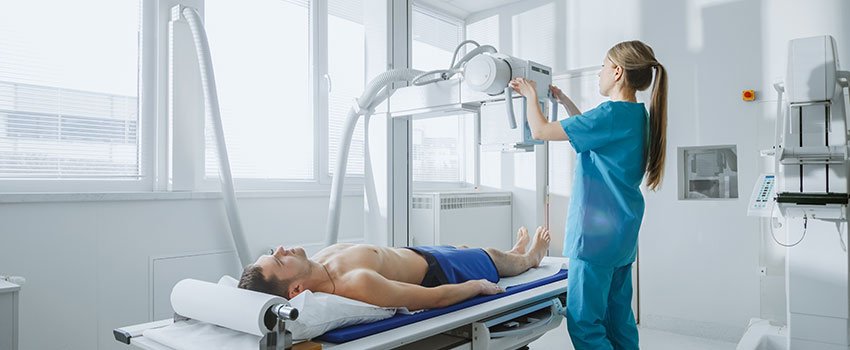
X-rays involve radiation exposure, so it’s understandable to be a little wary of getting one when the opportunity presents itself. However, we encourage you to let your guard down a little bit, as in most cases, the radiation exposure is generally so small that the benefit of the X-ray far outweighs the risks.
Our AFC Urgent Care Indian Trail team further explains below.
How Safe Are X-rays?
Since X-rays involve radiation, they are technically classified as a carcinogen by the World Health Organization (WHO) and the U.S. government and can potentially lead to a minutely increased risk of cancer later in life. However, the benefits of X-ray technology far outweigh the potential negative consequences of using them.
Different types of X-rays have different levels of radiation, and a chest or bone X-ray, which is the most commonly used type, has the lowest radiation level. These X-rays are equivalent to between 2.4 and 12 days of natural background radiation, like spending time in the sun or interacting with your microwave.
Ways to Limit Radiation Exposure
- Keep a record of all of your past imaging studies, especially those requiring radiation.
- Discuss with your doctor the risks and benefits of having the study in the first place and any potential alternative testing that may not include radiation exposure.
- Understand the purpose of the study and know why it is being recommended for you.
So, Are X-rays Safe for Kids?
Generally, yes. The only real risk with X-rays is if your child gets a lot of them, but for most children, radiation exposure probably only raises their risk of cancer a very small amount, if at all.
Plus, as we said earlier, the risks of not having an X-ray when needed are much greater than any small risk of the X-ray itself. We’ve listed some ways you can still be careful and limit your child’s X-ray risk below.
Ways to Exercise Caution
- Talk with your healthcare provider if you are worried that your child is receiving too many X-ray tests.
- Only allow X-rays, fluoroscopy or CT scans when there is a clear health benefit for your child.
- Use the lowest amount of radiation possible (based on your child’s size) to get the needed images.
- Only X-ray the area needed.
- Use shielding when possible, especially for very sensitive areas, such as the thyroid gland and genitals.
Although summer camps like Queens Sports Camp are fun, injuries can happen! Don’t hesitate to visit our AFC Urgent Care Indian Trail center today if your child needs an X-ray.